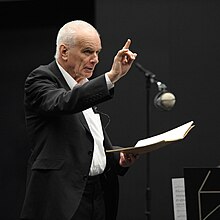
Peter Maxwell Davies, an English composer and conductor, wrote music in many genres, notably ten symphonies and works for the stage, from the monodrama Eight Songs for a Mad King (first performed in 1969) to The Hogboon (scheduled to be performed in June 2016). [1]
Contents
His official catalogue includes more than 334 works starting with his Op. 1 in 1955, but there are also about fifty earlier works dating back as far as 1942—regarded as juvenilia—and around a hundred minor mature works, designated by "WoO" (Werke ohne Opuszahl = Works without Opus number). These numbers were not assigned by the composer, but rather were first established only in 2010. [2]
He sometimes based his music on Mediaeval and Renaissance motifs and themes such as the opera Taverner , on the composer John Taverner. After his move to Orkney, he often used Orcadian themes, for example in An Orkney Wedding, with Sunrise for orchestra with bagpipes. Interested in classical forms, he composed series and cycles of works. The first seven of his ten symphonies form a cycle. He composed several concertos, including a Trumpet Concerto and a series of ten Strathclyde Concertos for different instruments, sometimes in combination. [3] [4] Of his fourteen string quartets, ten form a series, the Naxos Quartets which can be considered a multi-installment "novel." [5]